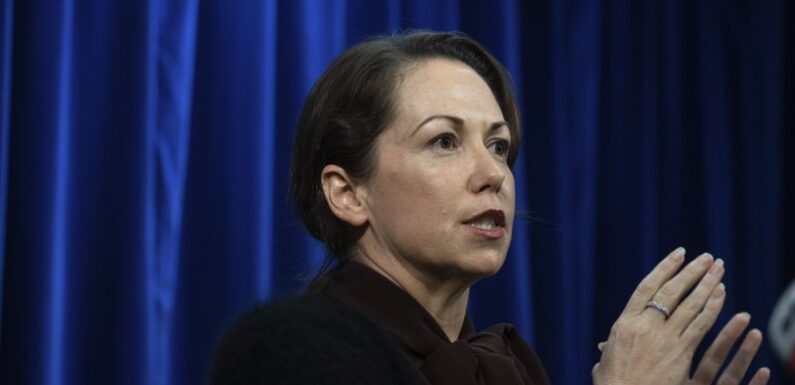
Save articles for later
Add articles to your saved list and come back to them any time.
Try to remember what you were like as a 10-year-old. Or think about the children you know who are around that age. Clearly, the ability of a pre-teen to understand the consequences of their actions is often limited. It is extraordinary, then, that in Victoria children as young as 10 can be still arrested, charged, held in detention on remand then subsequently kept in juvenile detention.
Victorian Attorney-General Jaclyn Symes will on Friday discuss with state counterparts a national approach to raising the age of criminal responsibility.Credit: Penny Stephens
Children are meant to have some protection under the legal principle of what is known as doli incapax, in which the law presumes a child under the age of 14 does not possess the knowledge or experience required to harbour true criminal intent. But this principle can be disproved or rebutted, says the Law Council of Australia, “by leading evidence to show that a child knew his or her actions were morally wrong”.
In practice, it says, “the presumption continues to wreak confusion as to whether the defence or prosecution bears the burden of proving that a child knew their conduct to be wrong. This leads to errors and results in children being held in custody for lengthy periods of time before the presumption can be led or tested in court, and the child acquitted.” Attorney-General Jaclyn Symes on Wednesday acknowledged it is an issue and will be overhauled.
There has been growing momentum across the country to heed legal and medical expert advice and raise the age at which a child can be held responsible for their actions. On Monday, the Andrews government did just that, committing to raising the age first to 12 and then to 14 within the next four years. This is a welcome move that brings us closer into line with international standards and the approach taken by some states and territories. It is ahead of most states, however, which are yet to commit to such reforms.
New Zealand has raised the age to 14 for most crimes; the minimum age in Canada, Ireland and Scotland is 12; in Denmark it is 15. Locally, there has been much discussion but varied concrete action: the Northern Territory has raised the age but only to 12; the Australian Capital Territory will soon introduce legislation to lift the minimum age of culpability to 12, and then 14 within two years; Tasmania has not changed the age of criminal responsibility but has lifted the minimum age of detention to 14, with some exceptions. Nationally, attorneys-general from across Australia will discuss a Commonwealth approach on Friday.
The evidence suggests that with the right checks and balances the age of 14 is an appropriate cut-off, possibly with exceptions for the most serious crimes, which could demand a bespoke response. A report commissioned in 2020 by federal, state and territory attorneys-general supported this case, fielding evidence that the psychological, cognitive and neurological development of children younger than 14 meant they would be unlikely to understand the impact of their actions.
It said that an educational, medical, psychological, social and cultural response would lead to better outcomes for the offenders and that early intervention would encourage some to change their behaviour. Prison terms, it said, were more likely to foster a lifetime of criminal behaviour than curtail it.
The Victorian government has resisted the demands of some social advocacy groups, Indigenous organisations, legal experts and medical bodies that have lobbied hard for an immediate rise to the age of 14 with no exceptions – what they term “carve-outs” – for especially serious offences. In this, though, the Victorian government is taking a lead from the ACT, which has pledged a similarly staggered approach, giving it time to implement the social service mechanisms necessary to support the children who would otherwise have ended up in the criminal justice system.
The state opposition has already pushed back, with shadow attorney-general Michael O’Brien claiming that “at a time when Victoria’s child protection services are in crisis, this proposal is no substitute for tackling the root causes of youth crime”.
This issue should be looked at through a lens of social good, rather than politics. And the expert consensus is that raising the age of criminal responsibility is the right approach. So the government is to be commended. And it is right to take time making these changes, to ensure there are no unintended negative consequences for youth justice. O’Brien and his party, and the community as a whole, should be reassured by this careful approach.
Patrick Elligett sends an exclusive newsletter to subscribers each week. Sign up to receive his Note from the Editor.
Most Viewed in National
From our partners
Source: Read Full Article
